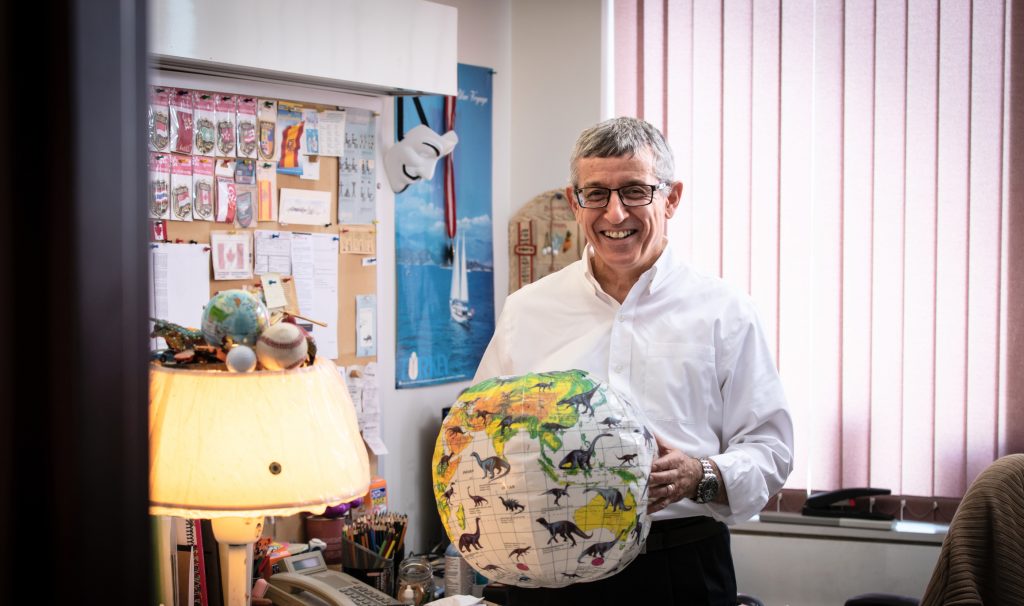Warning: This man will make you want to study stats

Mahmut Parlar uses a beach ball to teach statistics. One of the most-cited business academics in the country, he loves his work and wants his students to feel the same. /J.D. Howell photo
BY Sonia Verma
June 5, 2018
I hear — I forget
I see — I remember
I do — I understand
–White board message in Mahmut Parlar’s office
Mahmut Parlar believes in learning through doing. And he makes it fun.
The DeGroote School of Business professor starts a graduate-level statistics class by tossing a planet Earth beach ball to a student. “Close your eyes, forget everything you learned in middle school and put your finger on the globe,” he tells them. “Did you land on water or land?” Parlar writes down the response and gets the student to flip the ball to someone else, until everyone has had a chance.
The beach ball exercise is a great ice breaker in a room full of senior executives and MBA candidates, and Parlar uses it to illustrate a simple statistical principle. Invariably, about 70 per cent of the students land on water, “which bears out what we learned as kids about the earth’s surface area,” he says. “But any variance also supports what we learn about confidence intervals.”
Just as importantly, when they put their hands out to catch the ball, Parlar’s students let go of their preconceived notions about studying statistics.
“You always hear people say stats is boring, it’s dull,” he says, ruefully. “People take a stats course because it’s a requirement, not because they find it interesting or valuable.”
But statistics and data drive research, he notes. “It helps us understand how everything works. I make sure we do all the rigorous work and get it right, but why not make it fun, too?”
“Why not make it fun” could be Parlar’s motto. McMaster’s Distinguished Business Research Professor of operations management — “That means using mathematical models to solve business problems”— genuinely enjoys his work and wants his students to feel the same.
“If you don’t like what you’re doing, the rest of your career will be … well, it’ll be hell. I truly believe you should do what you love and love what you do.”
Parlar, who splits his year between operational research and teaching, is being awarded the Canadian Operational Research Society’s Award of Merit in recognition of nearly 40 years of stellar work in research, teaching and service.
Parlar received his PhD in Waterloo in 1979. After working at Concordia in Montreal and the University of New Brunswick, he came to McMaster in 1986. He has received more than 6,000 citations to his work; his landmark 1988 study on using game theory on inventory supply has been cited more than 400 times, making him one of the most-cited business academics in the country. That work continues to be the foundation of an enormous amount of research.
“It can be difficult to marry different disciplines into a new idea, but I wanted to try using game theory ideas for inventory management,” Parlar smiles as he talks about the ground-breaking paper. “And in academia, a citation is like getting a present. It’s been 30 years but every time I see someone is still citing my work, I feel like I’m getting a gift.”
Parlar tells his students about that feeling, and coaches them on the importance of writing good papers.
“Forget academic jargon and technical terms,” he advises them. “Make the title interesting. Write it well. Keep it simple. And please pay attention to grammar and punctuation.”
A big fan of Somerset Maugham, Parlar makes his students summarize the author’s short stories in their own words. “I make them do it again and again, until they get good at it,” he says. “I like to think it will help some of them get published.”
Parlar smiles a lot when he’s talking about his students.
“They’re all adults, but to me they’re like my kids. When they need help, I try to give it to them.”
His office white board has a smattering of foreign slang phrases on it, so that Parlar can practise casual conversation in international students’ mother tongues. “It helps put them at ease,” he explains.
And, of course, he works hard to keep them engaged. Enter the beach ball, which is just one item in a whole box of props.
“I spent a long time figuring out how to make learning interesting,” Parlar says. He points to another adage on his office wall, one he’s already used: Do what you love; love what you do.
“They pay me to do what I love,” he says. “I’m a lucky person.”


